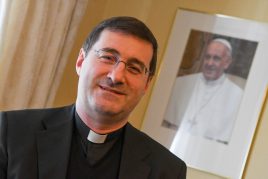
“The Council of Europe is the first European institution created after the Second World War designed to bolster unity among European countries.” The Holy See has been a member since 1970 with its Permanent Observer. Msgr. Paolo Rudelli (below, in his offices in Strasbourg photo SIR/Marco Calvarese, ), recently appointed Archbishop and Apostolic Nuncio, has been holding this position since 2014. He explained the significance of this presence to SIR: the objective is “to support the integration process with special regard to the founding values” that seventy years ago, when the Council was established, viewed culture and education as a priority.
An important word. “With the passing of the years, the Council devoted greater attention to the protection of human rights and democracy and to democratic institutions in Europe,” said Msgr. Rudelli. “In this context too the Holy See has an important word to offer, emanating from the Christian vision of man, from the fundamental value of the dignity of the human person as defined and actualized by the Popes in the social teaching of the Church, bo Pope Francis”, who visited the Council of Europe in 2014, “bringing a message of openness and return to the origins, to the value that holds together the culture and civilization of the European peoples.” That was precisely the wish of Pope Francis, expressed on 26 November 2014 on a handwritten note which is now hanging on the wall of one of the corridors of the solemn building that houses the Council’s headquarters: “I heartfully wish the Council of Europe to respond creatively to its vocation of unity so as to develop a civilization of encounter.”
The three pillars. The Council was formed on 5 May 1949 under the Treaty of London signed by 10 countries (Belgium, Denmark, France, Ireland, Italy, Luxembourg, the Netherlands, Norway, Sweden and the United Kingdom). In the last 70 years the Council has expanded its boundaries to include its current 47 members (plus 6 observer Countries among which the Holy See). Its structure and scope of activity have been considerably enriched under three pillars – human rights, democracy and the rule of law.
Areas of activity. Areas of activity of the Council include the strengthening of human rights, the fight against all forms of discrimination and racism, the protection of freedom of expression, gender equality, the protection of children’s rights, the defence of cultural diversity, education in human rights and democracy. Many battles have been won in this context.
The most emblematic: the abolition of the death penalty.
No executions have been carried out in the 47 Member States since 1997 (Belarus is the only European country where it still exists, which is also why it is not a member of the Council). All the “battles” are fought with the drafting and adoption of Conventions, which the member countries are required to ratify and whose implementation is monitored by the competent bodies.
- foto SIR/Marco Calvarese
- foto SIR/Marco Calvarese
- foto SIR/Marco Calvarese
The institutions. The Committee of Ministers is the decision-making body of this complex apparatus. It comprises the Foreign Affairs Ministers of all the member states that chair it on a rotating basis. The presidency is currently held by France. The Council has a Secretary General tasked with strategic planning. The current Secretary General is Thorbjørn Jagland (Norway), in office since 2009. In October, the baton will be handed over to Marija Pejčinović Burić, currently Minister of Foreign and European Affairs for Croatia. The Deputy Secretary General is Gabriella Battaini-Dragoni (Italy). Selection for these positions, for the role of Commissioner for Human Rights and the judges of the International Court of Human Rights, is made by the Parliamentary Assembly, composed of 324 appointed members from the parliaments of the Member States. The Court is another key body, a permanent judicial institution that safeguards the rights enshrined in the European Convention on Human Rights for every European citizen. The Commissioner for Human Rights acts independently to bring attention to issues linked to human rights violations.
- foto SIR/Marco Calvarese
- foto SIR/Marco Calvarese
Continental identity. The Council is currently in the process of rethinking its structures and activities, so as to remain faithful to its principles in a changed geopolitical context and to simplify its operating mechanisms, which over time have become too complex, time-consuming and costly. The challenges of today, in the words of the Observer Msgr. Rudelli, “include the gap that still exists between the East-European and West-European countries”, in an attempt to identify “the way to breathe with two lungs, as John Paul II said”, in order to create a “Europe that truly integrates all segments of the European identity.”
- foto SIR/Marco Calvarese
- foto SIR/Marco Calvarese
- foto SIR/Marco Calvarese
The voice of the Church. For Archbishop Rudelli, a further challenge “is the question of human rights and human dignity in a climate that sees a degree of anthropological fragmentation, i.e. a fragmentation of the visions of man, along with the emergence of new divisions, whereby, compared to 50 years ago, today it’s more difficult to reach a consensus on the fundamental visions of human dignity.” “We firmly believe that the contribution of the social doctrine of the Church and of the Pope’s Magisterium can offer support even in a pluralistic society such as that of today”, adds Msgr. Rudelli, who, in recent years, was entrusted with the task of expressing “the voice of the Church in all its entirety and in particular the Christian vision of the dignity of the human person as inspired by the Gospel, that forms part of the identity of European culture and civilization as we know it.”
- foto SIR/Marco Calvarese
- foto SIR/Marco Calvarese
- foto SIR/Marco Calvarese























